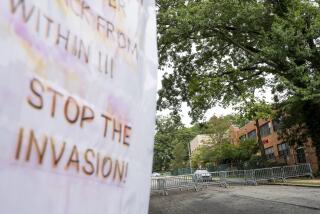There Are Many Good Apples in New York City
- Share via
NEW YORK — For many years, like many others, I held this city’s inhabitants in low esteem.
I always thought New York City was where people were insulting, and at least three out of every five were potential, or practicing, muggers.
I mean, isn’t it the place where taxis are driven by surly louts, invariably taking the long way in order to pad the meter price, where those who are paid to serve the public often don’t? Don’t people here make a religion out of not getting involved?
In my smugness, having spent little time in the last decade in this metropolis on the Hudson, that is how I used to feel about New York City and the millions who call it home.
Not anymore.
New Yorkers . . . I owe you an apology, herewith most sincerely tendered.
The enlightenment of this California transplant came one 98-degree morning in August. The place was Battery Park at the bottom of Manhattan Island.
My wife and I had stopped here for that one day en route to Boston, where we were to visit friends. We broke our journey simply because we had never seen the Statue of Liberty or the Empire State Building, up close and personal, as they say.
Hence our presence in Battery Park, where we lined up with several hundred other people to board the ferry to Liberty Island, home of the lady with the torch.
For 40 minutes we stood in the hot sun and broiled. Then just as the boat approached, Margaret, standing in front of me, turned her head and said, “Honey, I don’t feel very. . . .”
She never finished the sentence. I barely managed to catch her as she slumped to the ground, a victim of dehydration, or heat prostration, or whatever it is that hits you when you wait in the blazing sun that long on an empty stomach.
My initial reaction to her collapse, I confess, was not a gracious one.
“Jeez,” I thought, as I bent over her. “Of all the places to faint . . . New York!” Half of these people will just step around her to board the boat; the other half won’t even bother going around.
What happened next made me realize how unjust that assessment was. One after another, for three hours until we were able to return to our hotel, New Yorkers volunteered aid.
First, the crowd pushed back to give us space, obviously genuinely concerned.
A woman rushed to the gangplank and explained the situation to a member of the ferryboat crew.
He ran --yes, ran --back to us with a stick of some evil-smelling stuff that he waved under her nose until she began to revive. Then he offered to take us to the front of the queue and let us board first, if she felt well enough.
Surely, I thought, now the riot will break out. Move to the front of a New York City line? The other passengers will never stand for that.
I was wrong. Immediately they started to clear a path, although we did, ultimately, decline the pre-boarding offer.
A man offered a soft drink in a can, the only drink any of our prospective shipmates could find. Margaret took a sip. Then the man helped me get my very wobbly wife to a bench, in the shade, where she lay down. He left the soft drink.
The boat pulled out, carrying many of those who had waited in line with us, and a new cast of characters arrived.
An elderly woman came over to tell us that she had some heart pills in her purse, if we thought they would help. We didn’t, but it was a nice gesture. She then wandered off to look for a first-aid room for us.
She was back in 15 minutes with word that, while she hadn’t found anything designated as a medical center she had found an air-conditioned room, the museum in the park’s Ft. Clinton complex, where she thought my wife would be more comfortable.
Help From a Nurse
In the meantime another woman, a licensed nurse, had stopped to lend a hand. Grasping our predicament, she walked briskly over to a soft-drink vendor and asked for some ice.
Without hesitation the vendor filled a bag and the nurse brought it back to us, advising me to use the ice to cool Margaret’s brow and neck, and to try to get her to eat some of the cold stuff.
A young woman with a baby, noting my wife’s threatening nausea, brought over one of those protective cloths that mothers put over their shoulders while they burp their child.
“Please take it,” she said. Then, quickly, “I promise you, it’s clean.”
There was something so touching in the way she stressed the cleanliness of the cloth that, for some reason, my already growing feeling of shame at the injustice I had done Gothamites was heightened. We accepted her gift gratefully.
When we learned of the air-conditioned room I helped Margaret struggle to her feet. The walk was 200 yards, which must have looked more like 200 miles in her fevered and weakened state.
We hadn’t gone 10 feet before a man fell into step with us, supporting Margaret gently by the other arm, and stayed with us until we made it to the room.
There, park rangers took over, administering ice packs and offering water and Gatorade. They even emptied the small museum, explaining to those sent out that, because of the room’s coolness, it doubled as a first-aid center. It would reopen after the medical crisis had passed, the rangers said.
Doctor’s Visit
At one point a man tried to bring in his family to view the exhibit. He was politely denied entry, and told the reason.
“Oh,” he said. “I’m a doctor. Let me talk to the woman.”
He spent several minutes doing just that. Did Margaret have any tingling sensation in her fingers or toes? Did she feel sick? Had the rangers taken her temperature? (They had.)
“She’ll be OK,” he said. “Let her rest for a while, get some liquid into her and, when she’s well enough, take her back to your hotel. Get her something light to eat and let her sleep.” Then he left, rejoining his family.
Later, when my wife felt well enough to travel, one of the rangers walked a quarter of a mile in the heat to a taxi stand, selected a late-model taxi with good air conditioning, and brought it back close to the front of the fort, where, technically, it wasn’t allowed to be.
No Objection
The cab the ranger chose wasn’t the first in line, but the other drivers raised no objection. In half an hour we were back in our hotel room, and in minutes, our room-service call for tea and toast was answered.
After a two-hour nap Margaret was well again.
We got to Boston safely, but we still haven’t been to the Statue of Liberty or the Empire State Building. And we still hate the summer weather in the East.
But I’m convinced now that my view of New Yorkers was unfair. Like so many others, I was thoughtless and prejudiced.
I wish I was certain that our Battery Park experience would help change the views of some of my friends. I’m afraid, though, that it won’t.
When I told a Santa Monica neighbor what happened, explaining how so many New Yorkers helped us out, he said: “Ahh . . . they couldn’t have been locals. They must have been tourists.”
But I know better and so does Margaret.
New Yorkers . . . thanks. We owe you one.
More to Read
Sign up for Essential California
The most important California stories and recommendations in your inbox every morning.
You may occasionally receive promotional content from the Los Angeles Times.













